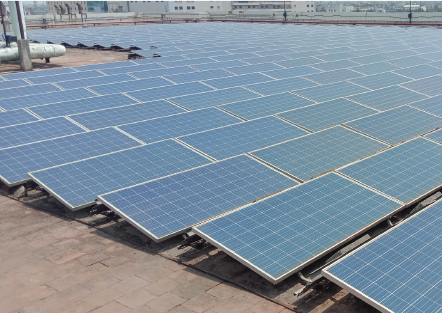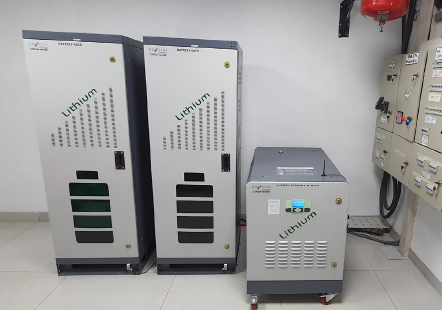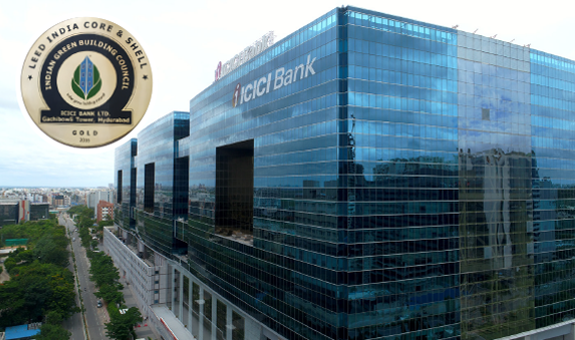Our lending to environment-friendly sectors is based
on appropriate assessment of risks and returns.
We have actively financed projects for capacity creation
in environment-friendly sectors. This includes renewable
energy sectors like solar, wind and hydro power and other
sustainable sectors like waste processing and mass rapid
transport. Our outstanding portfolio to the renewable
energy sectors was about ₹31.50 billion at March 31, 2021.
Further, the Bank availed lines of credit from select
multilateral agencies towards financing green/sustainable assets. The assets financed under these
lines include financing for wind, solar, biomass plants
and energy efficiency projects. At March 31, 2021, the
outstanding lending by us for such specific purposes was
USD 70.8 million.
An internal team within the Bank is dedicated to providing
financial assistance to initiatives that promote biodiversity,
environmental sustainability and initiatives in education,
health, sanitation and livelihoods. The team’s mandate
is to administer funding lines received from bilateral/
multilateral agencies/Government of India, specifically
for such projects. Their efforts include identifying
relevant projects, ensuring financial assistance through
collaboration or directly and knowledge sharing.
Total financial assistance provided by the group in
fiscal 2021 was about ₹265.0 million. Some of the projects
implemented in fiscal 2021 were:
- Assistance was provided for skilling in a tribal
belt in Amaravati district in Andhra Pradesh.
Adopting sustainable agriculture, sustainable livelihood
and village level institutional empowerment are some
of the focus areas which is expected to benefit the
people in 20 villages.
- A watershed development project in Yavatmal district
of Maharashtra has been given assistance that
would lead to 200 hectares of land being brought
under protective irrigation and treatment for
soil/water erosion.
- In the area of promoting education, assistance has
been provided for part of the cost for setting up a
school in Bhandara district of Maharashtra, which is
expected to provide educational facilities to students
belonging to low-income groups at a nominal fee.
Another project involved sponsoring the conversion of
two schools into innovation hubs for education.
- Establishment of a geriatric care centre for older
adults at Bhubaneswar that would provide outpatient,
diagnostic and surgical services, a rehabilitation centre
for the elderly, home care and tele medicine/internal
medicine facilities. The centre will also focus on
training eye care cadres in elderly care and research
on various age-related eye conditions.
- Government departments, institutions and
organisations were supported in their efforts to fight
the Covid-19 pandemic. This involved supplying
essential protection material, strengthening hospital
infrastructure and extending support to health workers.
ENVIRONMENT SENSTIVITY IN
THE BANK'S OPERATIONS
The Bank’s commitment to energy efficiency and adopting
environment-friendly practices in its operations remains a
prime objective. Our consistent efforts over several years,
and ongoing enhancements at our premises on various
fronts, has led to efficiency gains. These efforts range from
adopting green features at our premises, energy efficiency
practices, water conservation measures and paper
savings. Fiscal 2021 was a disruptive year as the Bank’s
large offices were partially closed and there was limited
opportunity to undertake any new energy conservation
initiatives, though certain ongoing projects continued.

Roof top solar panels at ICICI Bank Towers in Ambattur, Chennai.
Green Building Features

Roof top solar panels at ICICI Bank Towers in Ambattur, Chennai.
Since fiscal 2018, the Bank has been ensuring Indian Green
Building Council (IGBC) green building features in all its
new offices and branches at the time of set up. The total
number of offices awarded the highest rating was
11 at March 31, 2021, covering a total area of 2.28 million
square feet. The Bank has employees who are certified
IGBC Accredited Professionals.
97.5 KWp
of new solar power capacity added at the Bank’s
premises, taking the total onsite renewable energy
capacity to 2.9 MWp.
30 %
of the energy requirement at the Bank's three
large offices were met through renewable energy
in fiscal 2021.

A lithium ion battery storage system at an
ICICI Bank branch in Delhi.
Efforts Towards Reducing Emissions
Reducing greenhouse gas emissions and securing
the future of our planet requires an all-encompassing
approach. We have actively pursued opportunities to
adopt new technologies and energy-efficient practices
in our operations to reduce our operational emissions.
This is an ongoing effort at the Bank. Our efforts have
included undertaking audit of our large offices and
branches for identifying areas of focus for improving
energy savings, investing in new technologies and
experimenting with new ideas that are proven to be
favourable for the environment. One such recent effort
has been towards replacing diesel generating sets
with lithium ion battery storage system at branches
to enhance reliability and improve energy efficiency.
Another effort undertaken during fiscal 2021 was
replacing carbon dioxide based fire extinguishers with
Clean Agent fire extinguishers at the Bank’s branches
that are less damaging to the environment.
Our efforts to reduce emissions also include promoting
use of renewable energy sources wherever feasible at our
premises. During fiscal 2021, 97.5 KWp (Kilo Watt peak)
of new solar power capacity was added at the Bank’s
premises, taking the total onsite renewable energy capacity
to 2.9 MWp (Mega Watt peak) at March 31, 2021. The total
generation from these systems was 3 million kWh during
the year, which was 66% higher on a year-on-year basis.
Under the open access mechanism for power sourcing,
the Bank has signed power purchase agreements (PPA)
for solar and wind energy purchase for three of our
large offices. The total contracted capacity is 9 MWp.
These offices have been using renewable energy
since fiscal 2016, and during fiscal 2021, 30% of the
energy requirement at these offices was met through
renewable energy.
In fiscal 2021, the Bank engaged an external consultant
to evaluate our Scope 1* and Scope 2** emissions for
comprehensiveness and accuracy. The Bank’s Scope 1
and Scope 2 greenhouse gas emissions in the last three
years were as follows:
Water Savings
The Bank has been ensuring that water consumption per
day in its large offices is lower than the benchmark of
45 litres per person per day as per the Bureau of Indian
Standards for large offices. The Bank has undertaken
various initiatives to conserve water. The Bank recycles
and reuses waste water at three large offices including
the ICICI Service Centre (Corporate Office) at Bandra-Kurla
Complex, Mumbai. All new offices and branches opened
during the year were fitted with water-efficient plumbing
fixtures. Rainwater harvesting is being undertaken at three
large offices.
Paper Consumption
Fiscal 2021 was an exceptional year for paper
consumption, due to lockdown and containment
measures and large-scale adoption of work-from-home.
These factors and the growing use of digital channels led
to a decline in paper consumption.
Extending the digital advantages to customers and
in our processes are an ongoing effort. The Covid-19
pandemic accelerated the adoption of digital channels by
customers for undertaking banking activities. This was
augmented by a series of digital products launched by
us during the year to enable our customers to continue
accessing banking services without visiting a branch and
with minimal disruptions. We believe that encouraging
customers to adopt digital practices not only helps in
improving efficiency and reducing servicing time, but also
create a positive impact on the environment. ICICI STACK,
WhatsApp banking, Video KYC for onboarding of
customers and cardless cash withdrawal facility at ATMs
were some of the digital initiatives launched during the year
that enabled customers to transact in a safe and secure
environment. During the year, a range of insta-lending
products were offered to customers which are end-to-end digitally processed. There were significant efforts
towards decongesting processes and reducing physical
movement of documents. A significant portion of the
Bank’s operations today are paperless. Further, we procure
environment-friendly copier paper which is manufactured
from wheat straw, which is an agricultural residue.
The Bank is continuously reviewing its systems and
processes for optimising paper consumption.
Waste Management
The Bank focusses on waste reduction and its
management in every aspect of its operations.
The Bank undertakes recycling of organic waste using
composting techniques at the Bank’s large offices in
Mumbai at Bandra-Kurla Complex and Chandivli, and at
the Learning Centre in Khandala. E-waste is disposed
by handing over to certified recyclers. The Bank also
supports reuse of electronic devices. The Bank uses
remanufactured toners in printers which get recycled
at least 2-3 times. The Bank also recycles its IT assets
which are then donated.
Certifications
The Bank has adopted corporate objectives for
environment conservation activities in conformity with
the ISO-14001 standard 'International Organisation
for Standardisation' for environmental management
systems. This enables the Bank in developing policies
for addressing the objectives of environmental
sustainability and assessment of impact of the Bank’s
activities, products and services on the environment.
Health and safety systems at 13 large offices of
the Bank have been OHSAS 18001:2007* certified.
The environment management systems of the ICICI
Service Centre at Bandra-Kurla Complex in Mumbai are
both OHSAS 18001:2007 and ISO 14001:2004** certified.
The data centre was the country’s first data centre to be
awarded ‘Platinum’ by IGBC. The call centre at Thane in
Mumbai was declared a Leader in energy efficiency at
the National Level Energy Conservation & Management
Awards by the Confederation of Indian Industry (CII).
The Bank won 16 awards for energy efficiency/
environment management during fiscal 2021.




